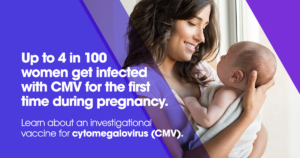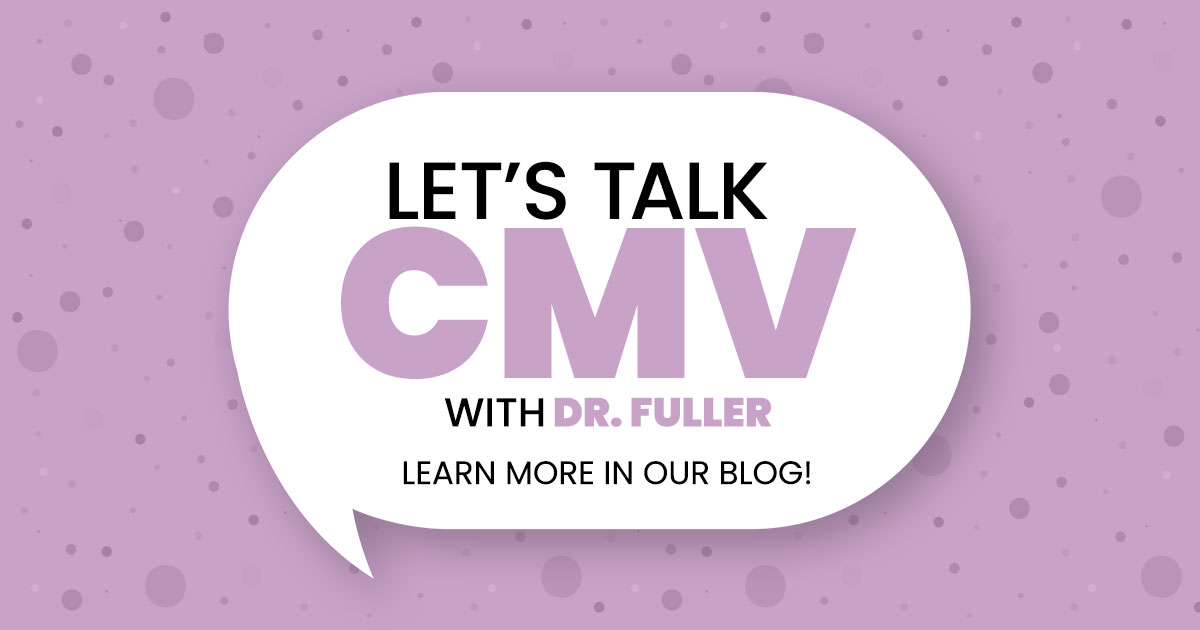Cytomegalovirus, (CMV) is a common and highly contagious viral infection that can affect infants during pregnancy. Many are unaware of the virus, so we’ve asked our very own Co-Medical Director and Gynecologist, Dr. Ashley Fuller, to answer some general questions about CMV. As an advocate for women’s health and pursuer of medical breakthroughs, Dr. Fuller brings her invaluable insights and knowledge to shed light on CMV, its impact on maternal health, and the cutting-edge research driving us closer to effective preventive measures and treatments. Get ready to delve into the world of CMV as we learn from the Q&A below!
What is CMV?
Dr. Fuller: CMV is cytomegalovirus. It’s a very, very common virus that most people have never heard of. It’s a virus that most of us get at some point in our lives. In fact, 1 in 3 kids have had cytomegalovirus by the time they reach age five. About half of people aged 40 have been infected with cytomegalovirus. So, it’s very common.
What are the symptoms?
Dr. Fuller: The symptoms of CMV can be absolutely nothing. Some people have infections and are completely asymptomatic and don’t even know they have it. In fact, that’s the most common thing. But some people do get symptoms, and usually, it’s fever, sore throat, fatigue, and swollen lymph nodes. If people are immunocompromised for whatever reason, like transplant patients or on immunosuppressants, they get they could get sicker and somewhat ill from it
Who gets CMV?
Dr. Fuller: Everyone gets CMV, for the most part. There’s no vaccine for it at this point. So, it tends to spread pretty quickly through saliva, through breast milk. It’s something that you can easily spread, especially by young children. One of the things we worry about is that people who are around small children can be easily infected because kids are often carriers of it, even for weeks after they have been sick from it. And this is particularly worrisome in our pregnant moms who have younger children or are around children because the big worry about CMV is actually about how it affects unborn children or the fetus
How do I know if I have/had CMV?
Dr. Fuller: While for most of us, CMV is not a worry. For people who are pregnant, if they get infected with CMV for the first time during their pregnancy, it can affect the pregnancy and the baby. Babies who get infected with CMV can develop lifelong problems like deafness, vision issues, small head called microcephaly, seizures, and developmental delay. Not all moms who get infected during pregnancy will have a baby who has problems. They estimate that about 1 in 200 babies that are born are infected or have been infected with CMV. About 1 in 5 of those will have some of those long-term disabilities. It is a very devastating diagnosis to be diagnosed during pregnancy with CMV because there’s not a lot that we can do. Some babies will get drastically ill from it. And we don’t have really a way to stop that from happening yet.
What happens if a pregnant mom gets CMV?
Dr. Fuller: The truth is, you probably won’t know. And we don’t. Although we do have tests to see if people have been exposed to CMV in the past, they’re not tests we routinely do. A test can’t predict whether someone’s going to get it in the near future, how sick they will be, or if a pregnant woman will pass it on to their baby. It’s not a routine test that we do in pregnancy or before pregnancy.

How does CMV spread? How can it be prevented?
Dr. Fuller: CMV spreads, as I mentioned, through saliva, through bodily fluids, and through sex also. But one of the biggest ways that we see CMV spread is through children – sharing plates, sharing utensils, sharing food. It’s recommended that moms and parents don’t do that, especially for pregnant moms, and that we work really hard on our washing and hand hygiene.
What is an mRNA vaccine?
Dr. Fuller: An mRNA vaccine is a vaccine that encodes for a protein that is taken up by a cell in the arm. And that cell actually transcribes that protein and puts it on the outside of its cell. It has a specific target that is usually found somewhere uniquely on the virus of interest. Once it’s put on the outside of the cell, the immune system of the body recognizes it as a foreign invader and kills that cell. This is why your arm gets so sore after a vaccine. Once that happens, the immune cell will tell its friends, “Hey, if you see this same protein again, we should kill it. It’s not supposed to be here.” And so that’s how it creates immunity. The mRNA snip that is in the vaccine that goes in the cell never stays in the cell. It never gets encoded into the DNA of the cell and is ‘chewed up’ after it’s into the arm
When can we expect an FDA-approved vaccine?
Dr. Fuller: There are several companies that are working toward a vaccine for CMV. While most of us don’t get very sick from it, it still is one of the leading causes of congenital deafness. And that is one of the reasons that we’re working toward trying to get a vaccine to help prevent some of these congenital problems that affect some newborn babies.
How can I learn more/get involved?
Dr. Fuller: If you’re interested in getting more involved in vaccine studies where we’re testing and evaluating for efficacy and safety, you can contact us here at Seattle Clinical Research Center or our sister clinic, Rainier Clinical Research Center.

Learn more about our CMV vaccine enrolling studies by clicking here and be a part of the generation that stands up to CMV!



